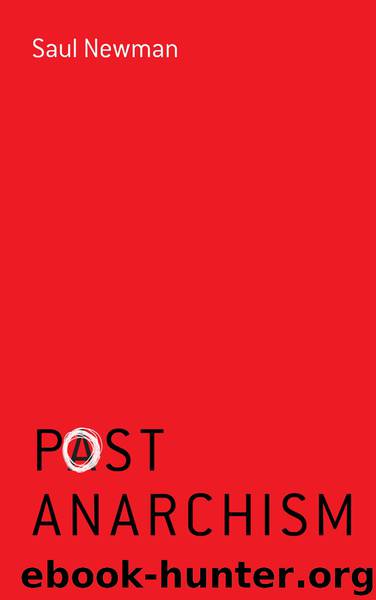Postanarchism by Saul Newman

Author:Saul Newman
Language: eng
Format: epub
ISBN: 9780745688770
Publisher: Wiley
Published: 2015-11-23T00:00:00+00:00
Sorel’s proletarian general strike: mythic war
Yet, if violence against violence is a central theme in anarchism, and indeed in postanarchism, then surely it is insufficient merely to accept the instrumental use of violence in the pursuit of ends of revolution. Violence against violence must mean something more than this – perhaps, as I suggested, the sublimation of violence into different forms of struggle that retain the language and symbolism of war yet refuse, or wherever possible avoid, real violence against persons.1 Someone who can help us think about this is Georges Sorel, who, in his Syndicalist phase at least, developed a radical understanding of insurrectionary violence which, I would argue, has important parallels with and implications for postanarchism.
In Reflections on Violence (1961) (Réflexions sur la violence, 1908), Sorel considers the prospects for class struggle and workers’ revolution at the turn of the twentieth century. The chief obstacle to the revolution, he argues, is the moral degeneration of the proletariat, its loss of class identity and its subsumption within the bourgeois moral universe. Proletarian moral and political energy has been dissipated through the internalization of bourgeois values, as well as through the obfuscating role of socialist politicians, whose function was to incorporate the working class into representative structures of the capitalist state and the ‘social peace’ – a kind of corporatist consensus between labour and capital which merely shrouded capitalism in humanitarian and social democratic illusions. It is as if Sorel predicted here the sad fate of social democracy and the ignominious politics of the Third Way nearly a century before its time.
Violence, Sorel argues, has an important role to play in restoring the political and moral vitality of the working class by sharpening class distinctions which had hitherto been blurred. Violence is what allows the proletariat to overcome its position of ‘decadence’, to spurn the hypocritical humanitarian overtures of the capitalists and socialist politicians, and to rediscover its ‘egoism’ (Sorel 1961: 90–1).2 In other words, violence allows the proletariat to affirm its autonomous class identity and values in opposition to that great agent of ‘decadence’ and ‘incapacity’, the modern state.
But what kind of violence is Sorel talking about here? We must pay close attention to his idea of the proletarian general strike and his understanding of the function of myth. The proletarian general strike is a form of revolutionary direct action engaged in by workers themselves, without the mediation of the state and political parties. It is at the same time a kind of myth, a myth of war – specifically class war, whose centrality to Marxist theory Sorel wanted to restore. The general strike embodies the symbolism of a battlefield – it enacts the drama of a decisive battle between the proletariat and the bourgeoisie. The drama of war has the effect of galvanizing the energy and passions of the working class. Sorel described the myth as ‘a body of images capable of evoking instinctively all the sentiments which correspond to the different manifestations of the war undertaken by Socialism against modern society’ (1961: 127).
Download
This site does not store any files on its server. We only index and link to content provided by other sites. Please contact the content providers to delete copyright contents if any and email us, we'll remove relevant links or contents immediately.
| Anarchism | Communism & Socialism |
| Conservatism & Liberalism | Democracy |
| Fascism | Libertarianism |
| Nationalism | Radicalism |
| Utopian |
The Secret History by Donna Tartt(18843)
The Social Justice Warrior Handbook by Lisa De Pasquale(12141)
Thirteen Reasons Why by Jay Asher(8792)
This Is How You Lose Her by Junot Diaz(6789)
Weapons of Math Destruction by Cathy O'Neil(6142)
Zero to One by Peter Thiel(5685)
Beartown by Fredrik Backman(5594)
The Myth of the Strong Leader by Archie Brown(5424)
The Fire Next Time by James Baldwin(5248)
How Democracies Die by Steven Levitsky & Daniel Ziblatt(5127)
Promise Me, Dad by Joe Biden(5087)
Stone's Rules by Roger Stone(5026)
A Higher Loyalty: Truth, Lies, and Leadership by James Comey(4842)
100 Deadly Skills by Clint Emerson(4840)
Rise and Kill First by Ronen Bergman(4701)
Secrecy World by Jake Bernstein(4643)
The David Icke Guide to the Global Conspiracy (and how to end it) by David Icke(4624)
The Farm by Tom Rob Smith(4434)
The Doomsday Machine by Daniel Ellsberg(4415)
